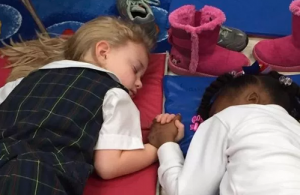 I grew up a Methodist surrounded by Southern Baptists in rural Arkansas. It was their mission to save my soul, so I was included in the weekly Sunbeams group at their church. It was there that I remember learning the song, Jesus Loves the Little Children of the World.
I grew up a Methodist surrounded by Southern Baptists in rural Arkansas. It was their mission to save my soul, so I was included in the weekly Sunbeams group at their church. It was there that I remember learning the song, Jesus Loves the Little Children of the World.
Those lyrics, which remind us that Jesus loves all the children of the world, red, brown, yellow, black and white…come back to me as I try to make sense of the recent events in Charlottesville, Virginia.
For young children who are repeatedly seeing the televised images of flags with crooked symbols on them flying above the crowds of marchers, flames coming from torches held by White people with angry faces, fighting in the streets and “graphic” scenes of violence between people—some White and some Black—that song about Jesus loving everybody is drowned out and replaced with cursing, name calling and screams.
For children who hear their parents, teachers and state and national leaders expressing remarks that indicate they are taking sides with the protestors who promote hate, it can have a long lasting impact.
A quote attributed to Byron Staley is very pertinent at this time in relating the current events to the country’s future. “Children are born without prejudice. Their minds like un-molded clay. They are so accepting of the world around them. It’s one of the many beautiful things about a child’s heart.” I agree with Mr. Staley, children are born without prejudice, but they are accepting of the world around them—good or bad. What kind of world are adults creating today that children will inherit in a few short years?
There is no justification for hate. None. Hate is unnatural. However, children who grow up in hate-filled environments know nothing but hate and carry its burden into adulthood.
Demonstrators carrying signs and flags symbolizing the superiority of one race over another were not born to feel or express their superiority over those different from themselves. Something (or someone) changed the life path of these individuals to embrace and act upon the need they have to feel superior over others who they view as inferior, for whatever reason.
The results of a study conducted in 2012 by researchers including Dr. Mahzarin Banaji, a renowned Harvard University psychologist, brain researcher and prejudice expert, suggests that even though they may not understand the “why’’ of their feelings, children exposed to racism tend to accept and embrace it as young as age 3, and in just a matter of days. Banaji suggests that the formation of beliefs that will lead to racism in later years can be off set by parents and teachers exposing young children to children and adults who are of different races interacting in positive environments where one race is not dominate over another and everyone in the group setting is given equal respect and treatment by those in charge.
The complexities of racism make it impossible to address in a blog or even a book of reflections, theories or research studies. As complex as it is, it is also simple. Every person of faith and concern for the future of our country must stop trying to be right and start being smart. Regardless if children are raised in Jewish, Muslim, Hindu or Christian faith-based homes or in homes where religion is not a focus, they are going to pay the price of the “sins of their fathers” if this continues.
Yes, Christians say they believe Jesus loves all the children of the world, but how do they show it? The lessons being taught today will either result in repeating our past sins or serve as a beginning to chart a new course for our country where we elect leaders who act as if we are all valued as individuals.
Most importantly: Will these lessons teach us as citizens to demonstrate daily respect for all people we encounter, regardless of race, gender, income status or religion? Or will they pass us by and fall on deaf ears and a blind eye?
Our children are watching and learning.
By Dr. Cathy Grace


